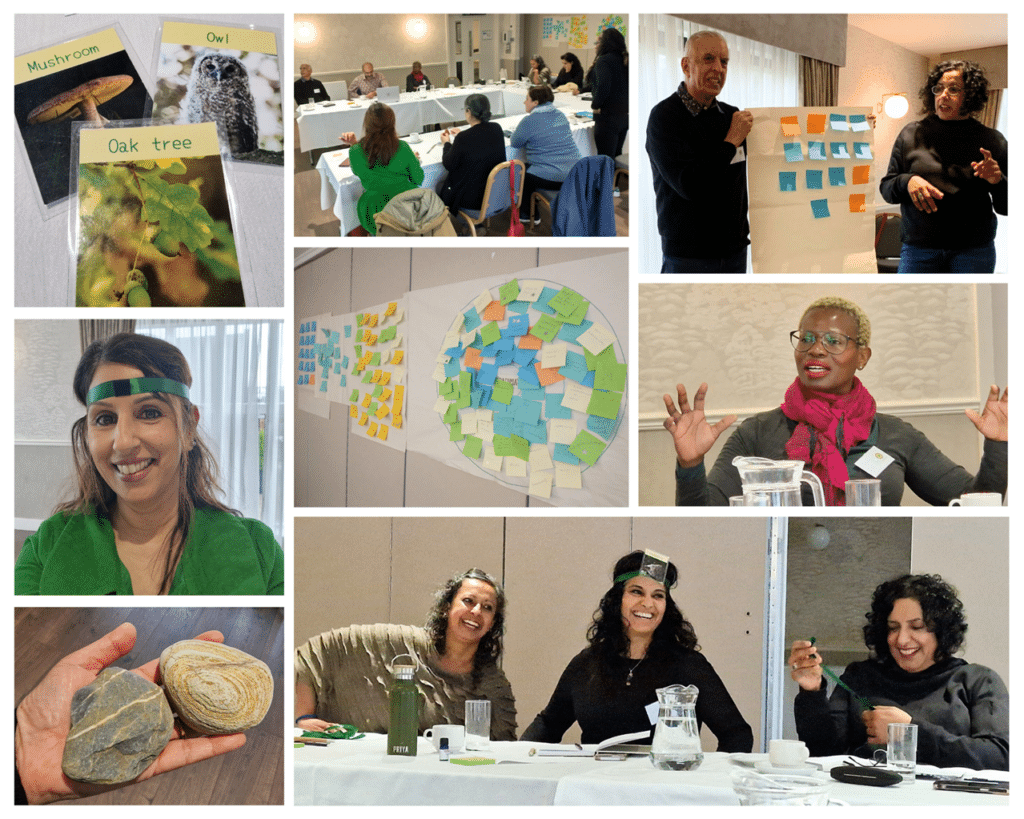Location: Central England, UK (United Kingdom)
Lead partner: Dadima’s CIC & Coventry University
Involved partners:
Chilterns Conservation Board (AONB – Area of Outstanding Natural Beauty), participants of the regular nature walks organised by Dadima’s (Chilterns AONB, Aston Rowant Nature Reserve, Chiltern Open Air Museum, Ridgeway National Trails).

The UK case study is designed to deepen our understanding of how people from ethnic minority communities view and engage with biodiversity in its broadest sense. The primary objective of this study is to foster intercultural nature dialogues with a diverse community. This will encourage the exchange of ideas and knowledge about biodiversity in a collaborative learning community, where different forms of knowledge are respected, shared, and explored. The aim is to create a space where individuals can learn from one another and build a better understanding of their connection to nature and perceptions associated with biodiversity and biodiversity loss.
The research seeks to explore the following questions:
- How do you understand the term ‘biodiversity’?
- Do you see its importance/relevance to your everyday life?
- What do you see as potential challenges of learning about biodiversity for yourself, or the people you interact with?
- If you could learn more, what form would that learning take?
- How do you think you can contribute to the global agenda to safeguard biodiversity?
- To what extent can creative intervention methods (e.g. experiential learning, participatory filmmaking and deliberative interventions) influence knowledge associated with biodiversity and impact on individual’s and communities’ values and behaviour?
Expected impacts
Individual level
Members of the Learning Community (LC) are both sharing and developing their knowledge and commitment to biodiversity, and will be able to respond to local, national, and global challenges on an individual level with greater confidence.
Community level
LC members will feel like they can and do contribute to biodiversity knowledge and action, and sharing learning utilising an approach in which their voices and knowledge are valued and central to local, national, and global dialogues and agendas.
The research participants from ethnic minority communities will contribute to knowledge production in a valuable way, helping to democratise the research process through disrupting the Eurocentric privileged lens that has tended to dominate science knowledge production.
We will build the capacity of LC participants to critically engage with dominant racialised discourses in the UK, which reproduces notions of “the other” in which Black, Asian and minority ethnic communities are constructed as disengaged, disconnected and/or disinterested with biodiversity (loss and safeguarding agenda(s)) and nature.
Institutional/Policy level
The operational and methodological approaches used in this intensive case study (and Learning Community) can be replicated on a wider scale to create a national network in the UK. Dadima’s case intensive case study illuminates the importance of engaging with individuals and communities and why it is important for the national and global biodiversity agenda(s) to integrate views and experiences of groups whose voices are seldom heard.
Biodiversity
The inclusion of diverse social groups in Learning Communities creates a space for the participants to focus attention on their knowledge about biodiversity and share how factors such as heritage and culture intersects with understanding, behaviour and values. The Learning Communities is a vehicle for focusing attention on the relationship between biodiversity and how it is prioritised in the views and practices of individuals, and in those of their families and wider communities.
Intersectionality dimensions
The intersectional dimensions of the learning community include:
- Representatives with connections to the Global South
- An intergenerational group, participants range from 30 to 70 years old.
- Parents and grand parents
- Majority female (n=8).
- Diverse familial circumstances (married, single, in a same sex relationships)
- Majority are university graduates and in (or were in) professional occupations
Working approach
LC workshops are designed and delivered using a range of methods (see list below). Activities employed allow for the collection of rich qualitative data, but also support in building the LC community through creation of a safe space for dialogue and opportunities for exploration and learning about biodiversity. Workshops are delivered online and face-to-face and in-between sessions a WhatsApp group is used for participants to share their daily biodiversity stories. We use:
- Educational activities (e.g. mindfulness, deep dive into biodiversity, participatory film making).
- Expert guest speaker talks
- Constant group of LC participants
- Citizen Science Activities (e.g. analysing what impact the food we eat regularly has on biodiversity)
- Outdoor and online activities
- Relationship building activities
- WhatsApp group for sharing biodiversity related information with LC
- Values-based nature connections
Dadima’s held their first workshop with the Learning Community on 4th February 2024. As this was the first meeting it was important for the workshop to create opportunities for everyone to get to know each other. The workshop used ice breaker games (to better understand the concept of biodiversity and build relationships) and a group work systems mapping exercise (connections to nature through Dadima’s walks). Their second in-person workshop was on April 7th, and the next will be towards the end of June.
Publications and links
Today has been an inspiring @Planet4bProject research day W @gesbrown Coventry Uni & Dadima's co-researchers on #biodiversityloss – what it means to the diverse communities we serve. We hold rich ancestral knowledge & #naturestories and we aim to amplify this. Watch this space! pic.twitter.com/6ecOvSsJSi
— Dr Geeta Ludhra (@educatinggeeta) February 4, 2024
CAWR –
In Dec, Geraldine Brown & Barbara Smith traveled to Martin Luther University of Halle-Wittenberg in Germany to kick off our new Horizon Europe project ‘Planet4B’ led by Alex Franklin.
Along with our practice partner, Dadima, we were excited to begin this project. @CovUniResearch pic.twitter.com/yznulSikgs— CAWR Coventry (@CoventryCAWR) February 16, 2023
Training in Berlin with the @Planet4bProject – CAWR’s Geraldine Brown and Ben Cook introduce #participatoryfilmmaking as one method for triggering social change to improve #biodiversity.
We are looking forward to seeing the films #PLANET4B #behaviourchange #dadimaschilternswalks pic.twitter.com/V4AXHq4vFw— CAWR Coventry (@CoventryCAWR) January 17, 2024
https://renewbiodiversity.org.uk/people-of-colour-in-green-spaces-key-barriers-and-the-role-of-academia/
https://www.dailymail.co.uk/news/article-13058991/Britains-countryside-racist-colonial-white-space-people-colour-framed-place-wildlife-charities-say
